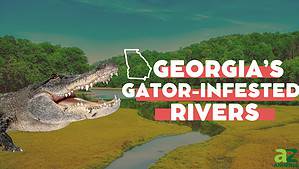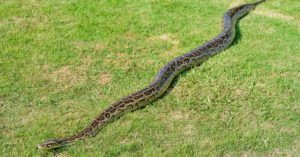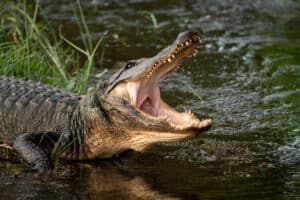Alligators in Jacksonville? How would a 10-foot reptilian apex predator survive in such an urban environment? Surely, there’s no way that can be correct… right? Guess again. Although there isn’t a huge alligator population in Jacksonville, the golden rule of Florida is this: if there is fresh water, there are alligators. Whether you’re diving into some of the best swimming holes near Jacksonville, visiting St. Johns River, or hanging out by the pier, if you’re near brackish or freshwater, you could be in the presence of these real-life swamp dragons. Keep reading to learn how and where you could encounter our scaley friends while visiting Florida’s largest city.
What’s So Special About Jacksonville?
Jacksonville is located in Duval County and is on the Atlantic coast of Florida, making it a perfect combination of 9-5 city living and leisurely beach life. The largest city in Florida and the 11th largest in the United States, Jacksonville is home to 971,319 people and welcomed 24,807,676 visitors last year. Although Jacksonville has long been known for banking and financial services, the city does offer plenty of activities to get out and enjoy nature. In addition to downtown, Jacksonville showcases 22 miles of beaches, world-class golf greens, untouched woodlands, and year-round sunshine. Overall, Jacksonville features the largest urban park system in the country. With 80,000 acres of land devoted to 400 city parks, seven state parks, several gardens, and three national parks, there’s something for everyone to enjoy.

Downtown Jacksonville showcases the beautiful view of the St. Johns River.
©ESB Professional/Shutterstock.com
Alligators: The Infestants of Florida
When they’re not startling unsuspecting citizens of metropolitan areas like Jacksonville, alligators can typically be found perched out in the sun, soaking up the heat to help regulate their internal temperature. These shy creatures prefer to be left unbothered in secluded swampy areas and typically prey on fish, mollusks, birds, reptiles, and smaller mammals. Alligators live anywhere from 30 to 60 years and can grow up to a staggering 15 feet long. At full maturity, gators weigh anywhere from 400 to 800 pounds. Once thought to be nearing extinction, the alligator population has since fully recovered, and there are now an estimated 1.3 million gators in Florida alone.
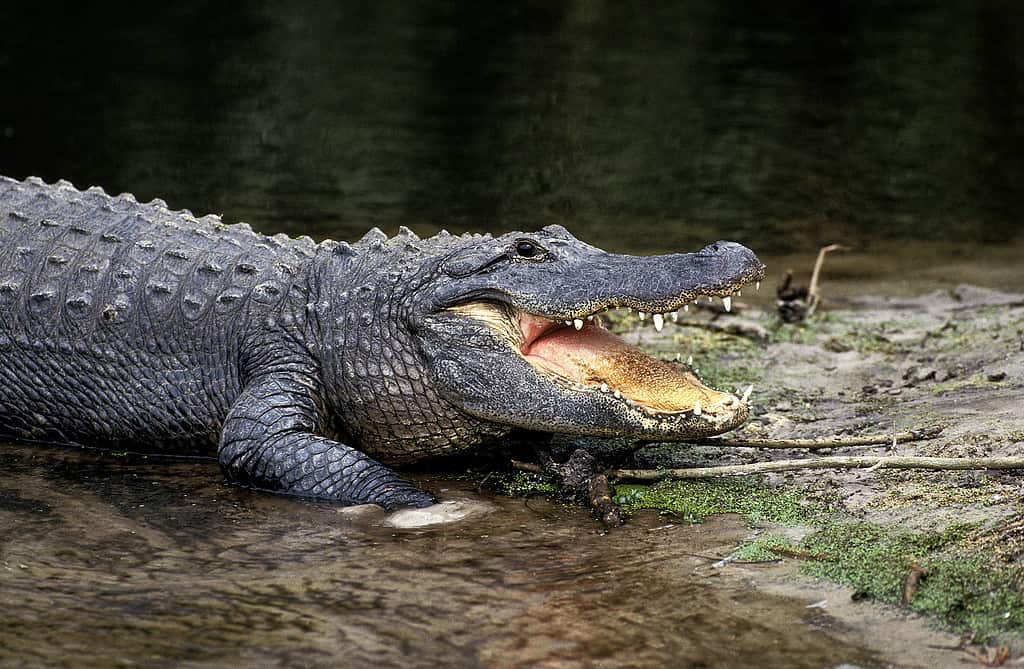
There are an estimated 1.3 million gators in the state of Florida.
©slowmotiongli/iStock via Getty Images
Jacksonville Alligator Encounters This Year
When humans and alligators live in such proximity, it’s only a matter of time before the two cross paths. Just this year, there have been three relatively high-profile instances in the Jacksonville area where people have encountered gators — all in very different settings. Whether at the pier, going to school, or putting on the green, our scaley friends are always close by.
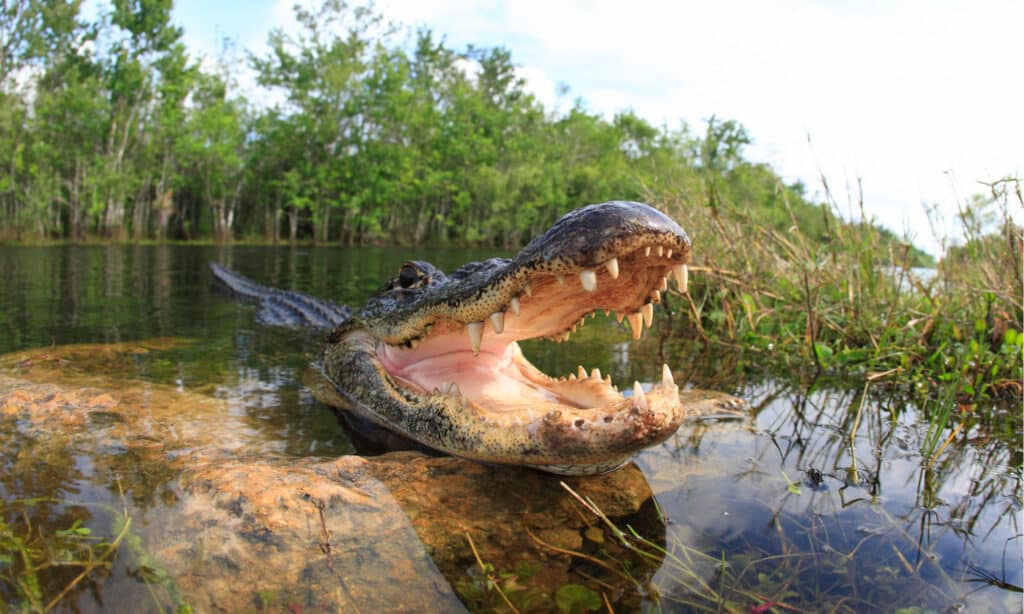
Alligators can be found in Florida anywhere there is freshwater.
©Thierry Eidenweil/Shutterstock.com
Naval Air Station Jacksonville
Earlier this summer, a giant alligator was seen strolling on the green at NAS Jacksonville. This massive reptile was spotted on hole #3 of the naval golf course. However, it didn’t cause any issues with golfers finishing their games. Instead, golfers simply joked it was the newest addition to the Casa Linda Oaks golf course security team.
St. Clair Evans Academy
In May, a 10-foot alligator was caught snooping around outside the St. Clair Evans Academy, a distinguished Jacksonville elementary school. Fortunately, this alligator spotting occurred on a Sunday, so no students were actually at the school. However, the uncommon visitor caught the attention of several locals. Fortunately for everyone involved, a local trapper arrived and teamed up with first responders to successfully relocate the gator.
Incredibly Rare Jacksonville Pier Video
A juvenile alligator went viral on TikTok when it went out for a swim, only to be joined by several 6-foot lemon sharks. The lemon shark is an occasional prey item for larger, more mature alligators, but this juvenile gator was surrounded by sharks twice its size. Thankfully, no animals were harmed, and everyone went their separate ways peacefully. Despite their habitats overlapping, this video showed two species we rarely see together. More curiously, this meeting in freshwater was unbelievably close to humans on the nearby pier.
Do Alligators Eat Humans?
Now that you know alligators are in Jacksonville, should you be concerned for your safety? Alligator attacks on humans do happen, but they’re relatively rare. There have only been 401 registered alligator bites in the state of Florida as of 1948. The reason alligator attacks are so uncommon is that they do not actively hunt humans. Instead, most gator attacks on humans are a result of the alligator feeling provoked or threatened. These situations can occur if a person gets too close intentionally (or accidentally), encroaches on a gator’s nest, or is seen splashing around in water inhabited by gators, which mimics prey behavior.
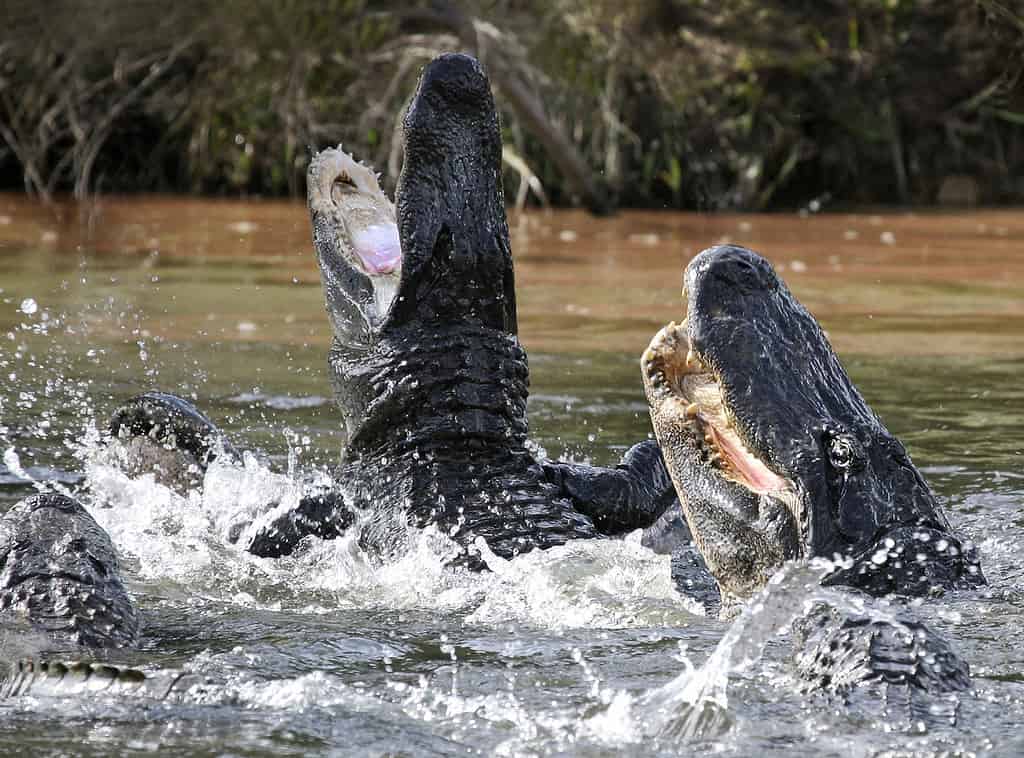
Alligator attacks on humans are relatively rare but do happen.
©© mark higgins/iStock via Getty Images
Where Are You Most Likely to Encounter Alligators?
As mentioned previously, alligators can be found anywhere there is fresh water. That includes swamps, marshes, lakes, streams, and rivers – both natural and manmade. Something people often overlook is that manmade bodies of water at popular locations, such as theme parks and golf courses, provide a false sense of safety. However, alligators are well known to make their way into these human-built bodies of water due to their natural habitat becoming smaller. Additionally, alligators will also venture into brackish water. Brackish water is when freshwater streams or rivers dump into the ocean, creating a mix of both fresh and saltwater. Ultimately, alligators will occasionally tolerate saltwater for short periods but will not stay there long term. Fortunately, that means they do not commonly visit Jacksonville Beach.
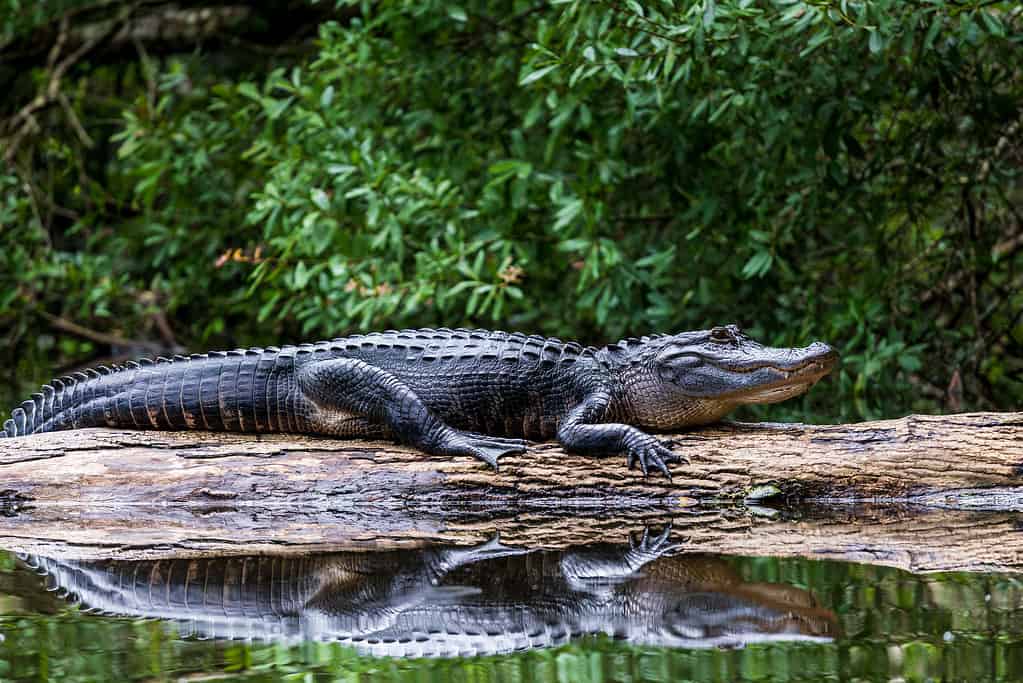
Alligators can be found in both freshwater and brackish water.
©Joe Pearl Photography/iStock via Getty Images
Signs There May Be an Alligator Around
You’re following the rules, but what if there’s an incognito reptile in the water with you? Alligators are apex predators due to their massive size and top-notch ability to hide. So, it’s not uncommon for them to travel completely under the radar in Florida waters. Here are a few easy tips to determine if there’s a ninja gator swimming nearby:
- Check nearby logs and banks. Alligators like to sun themselves often but blend in easily.
- Examine any stick, log, or other knob poking out of the water. Alligators commonly float with only their eyes and nostrils visible.
- Pay attention to any sounds. While they’re pros at entering the water and swimming quietly, any splashing or other water noises could signify they’re close or hunting.
- Do a visual inspection of the land around you to check for indentations where an alligator has been resting recently. Also, search for active gator nests. Nesting gators can be especially aggressive.
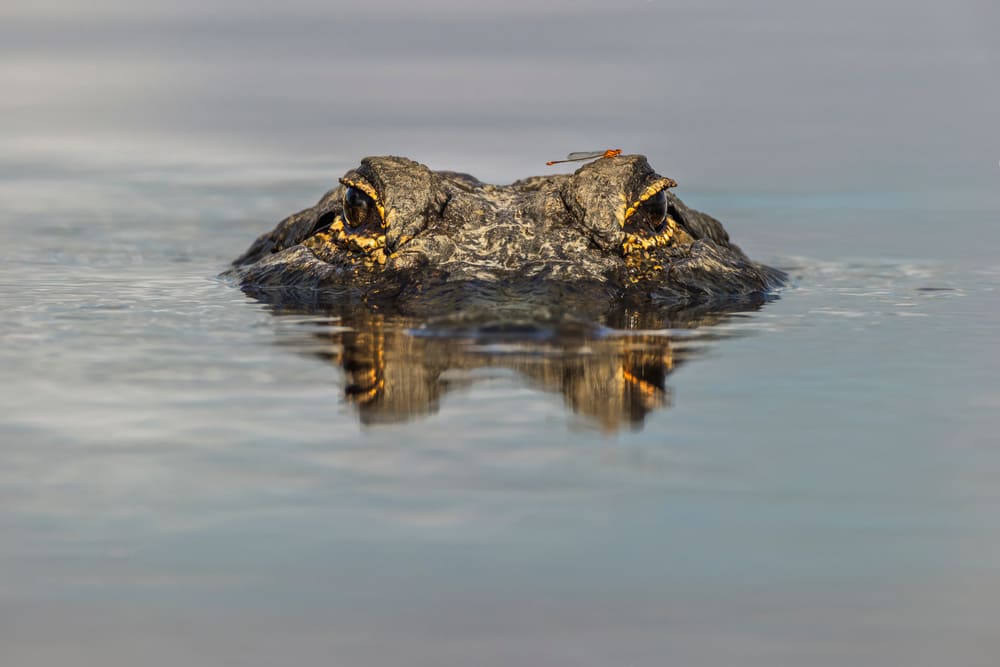
It’s common to only see the eyes and nostrils of an alligator above water.
©Danita Delimont/Shutterstock.com
Safely Precautions for Alligator Areas
According to the Florida Fish and Wildlife Conservation Commission, alligators call all 67 Florida counties home. So, if you’ll be venturing or living anywhere in Florida, it’s important to know how to coexist with gators safely. Follow these life-saving safety precautions:
- Always supervise children when you’re near or in the water. This includes shallow water.
- Avoid murky water.
- Only swim in designated swimming areas and only during the day.
- Read all safety signage in swimming areas.
- Do not allow pets to swim – ever.
- Keep pets away from the water and on leashes for their safety.
- Never feed alligators.
- Trying to take selfies with alligators is unsafe (and sort of cringe).
- Always dispose of trash responsibly. Food waste left in or near water can lead to alligators associating humans with food.
- If you encounter an alligator and are unable to create space between you, make a loud noise and wave your arms to appear bigger. This could potentially scare the gator away.
- Call the Florida FWC to request the removal of any nuisance alligators. (866.392.4286)
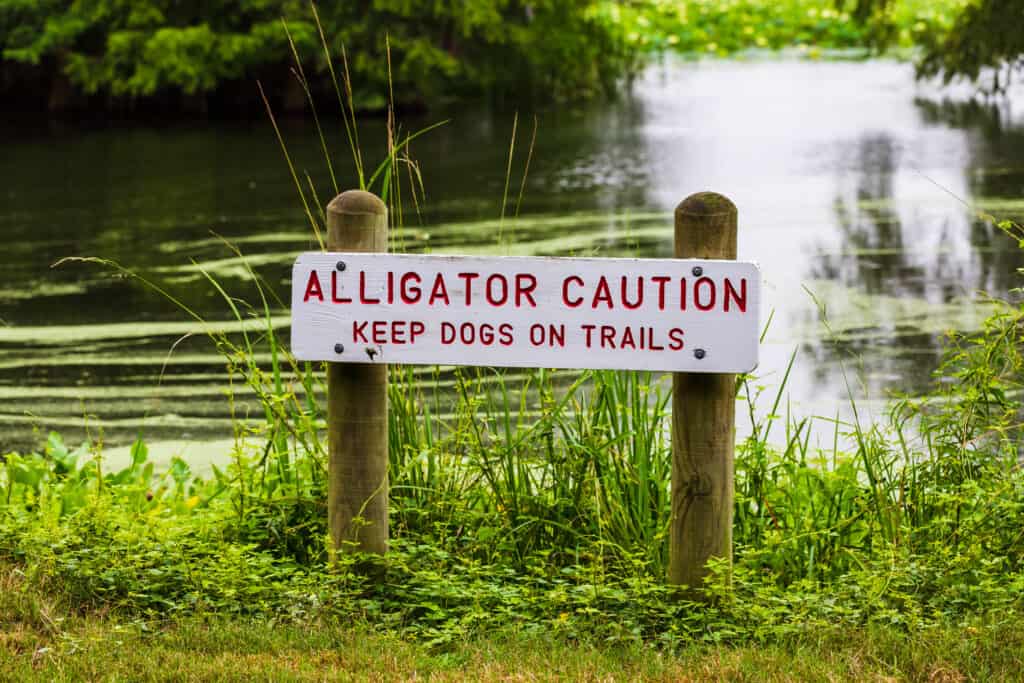
Be vigilant near water in Florida to avoid any emergencies for yourself, your loved ones, and your pets.
©Chad Robertson Media/Shutterstock.com
Lurking or Lacking? Alligators in Jacksonville.
While there may not be a booming alligator population in Jacksonville, they’re still lurking in the peripherals for Florida natives and visitors alike. With the presence of plenty of freshwater, most notably the St. Johns River, our scaly friends are not much more than a splash of the water away. If you’ll be in the Jacksonville area anytime soon, enjoy the many amazing activities the city has to offer, but be aware of your surroundings and keep an eye out for our favorite Floridian tail thrashers!
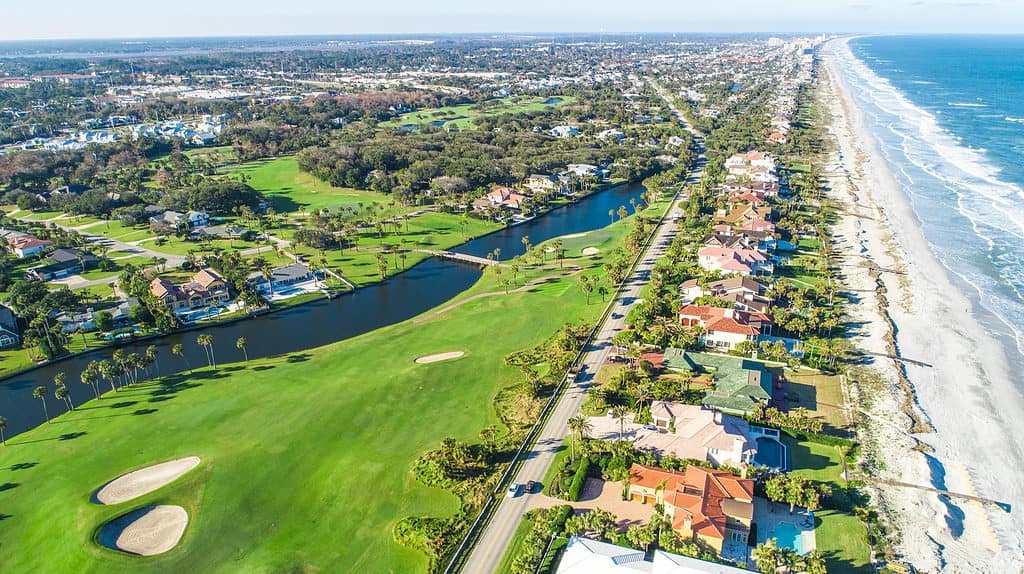
Jacksonville offers residents and visitors astounding views.
©iStock.com/TraceRouda
The photo featured at the top of this post is © Thierry Eidenweil/Shutterstock.com
Thank you for reading! Have some feedback for us? Contact the AZ Animals editorial team.




